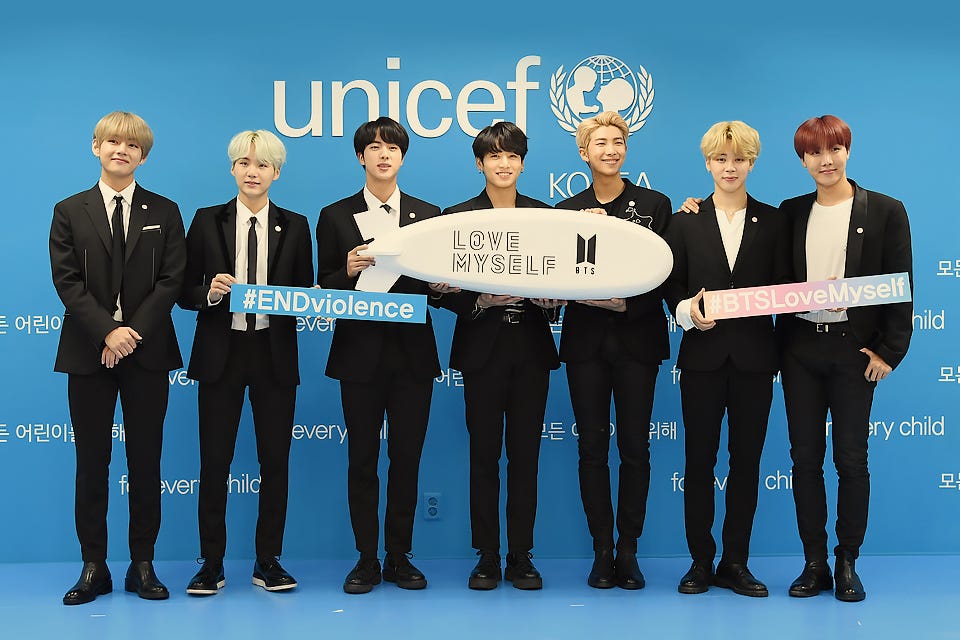How BTS and K-Pop Explain the World
The Korean Wave, otherwise known as Hallyu, continues its global march with popular boy band BTS leading the charge. What this tells us about our world today.
Oppa, Gangnam Style!
We all remember those words from that summer of 2012 when the South Korean pop singer/rapper Psy redefined the word “viral” and etched those words and his kitschy dance moves into our collective global consciousness.
The summer of Gangnam Style bled into the fall, and the rest is history: the first Youtube video to hit one billion views (it’s at 4 billion+ now), the first K-pop star to truly go global, and thousands of localized “Gangnam Style” videos sprouting across the world from Saudi Arabia to the Philippines and beyond (I hesitate to add links here lest you, dear reader, dive deep into a global Gangnam style tour on youtube as I did recently, only to come up for air — woozy and disoriented — an hour later).
But why recall Gangnam Style now? A very “Emerging World” story caught my eye this week. The South Korean firm that manages the wildly popular K-pop group BTS has acquired a major US talent firm that handles the likes of Justin Bieber, Ariana Grande and others for $1 billion. So, a South Korean company will now manage some of America’s hottest stars in a powerful demonstration of the newfound global power of K-pop (South Korea’s hottest export: pop music), and the accelerating globalization of the entertainment industry.
It’s one of those under-the-radar “the world is turning” stories, but what does it tell us about our turning world? Let’s start with multi-polarity, a concept increasingly discussed in geopolitical terms, but one that we should talk about in business too.
The world of entertainment - like other industries -- is no longer dominated by Western majors. Yes, Hollywood still wields enormous clout and U.S-based companies like Netflix and Amazon are redefining entertainment offerings globally, but Bollywood remains the most prolific center of movie creation and its stars like Shah Rukh Khan can go head-to-head with Hollywood bigwigs in popularity in most parts of the world.
Meanwhile, Turkish soap operas have been catching fire from the Middle East to Latin America (Turkish serials are the Latin telenovelas of today’s emerging world), Nigeria’s film industry (Nollywood) and African pop artists are exploding worldwide, hitting the Western cultural mainstream, and Netflix brings us top-notch serials from Latin America to the Middle East. Meanwhile, the Korean wave of music and entertainment, or Hallyu, seems to be growing ever faster and deeper. (For more on this, see Gangnam Style Globalization below).
The South Korean firm, HYBE (formerly Big Hit Entertainment), that made the purchase of the U.S firm, Ithaca Holdings, nearly went bankrupt in 2007. But curating and managing BTS — arguably the world’s most famous pop group today — has been a lucrative business. As the Wall Street Journal reported, “the deal will see HYBE taking full ownership of Ithaca, including a significant minority stake that had been controlled by the U.S. private-equity firm Carlyle Group…Ithaca Holdings, known for its acumen generating buzz around its artists through cross-promotion, has also grown to include Big Machine Label Group, a division focused on country music.”
A country music label with its parent company headquarters in Seoul? That’s about as good an example of globalization as it gets.
To be sure, stories of emerging world companies doing big things on the global stage is not new. Some of the most globally impactful companies in various industries hail from the emerging world, from Emirates Airline and Turkish Airways disrupting aviation, to China’s Tencent reshaping gaming and messaging, to companies like India’s Tata Consulting Services, Brazil’s JBS (meat and proteins) or Vale (mining), South Africa’s SABMiller (brewing), China’s Huawei Technologies, or Mexico’s Grupo Bimbo (breads and baked goods) all emerging as global — not just national or regional — leaders in their respective fields.
The United States has also become far more globalized than it sometimes realizes. From its food industry to its home appliances to some of its iconic brands, dig a little deeper and you’ll find majority or significant foreign ownership. Examples: AMC Theaters, Budweiser (Anheuser Busch), Holiday Inn, Good Humor, Burger King, Jim Beam whisky, and the list goes on and on, with owners from China to Brazil.
But while U.S food, hospitality, and consumer goods have been globalized for a while, the country generally maintained a fortress around its world of mainstream entertainment, with European rock bands and British actors the main exception. Even when Psy stormed the United States, one got the impression that it was a fleeting moment, a quirky, foreign act that was fun, but not enduring.
It wasn’t the moment that K-pop would go mainstream and explode in the United States. That moment would have to wait for the BTS storm.
It took a few years since their first arrival in the U.S in 2013, but the Korean band are bonafide superstars now. In May 2019, BTS played to 100,000 fans at MetLife Stadium in New Jersey. Earlier that month they played to nearly 90,000 fans at Soldier Field in Chicago. BTS is the only Asian band to ever top the Billboard 100 Hot Chart, and their devoted fans — known affectionately as “the Army” — are a formidable social media force.
In fact, BTS first got the attention of the U.S music industry when it won the award for “Top Social Artist” at the Billboard Music Awards in 2017. How do you win that award? With devoted fans because the award recognizes the artist that receives the most social media engagement. So, while Psy exploded onto the world stage thanks to Youtube, social media has been the key for BTS. Their Twitter feed has more than 34 million followers, and the band actively posts new content on Instagram.
Full disclosure: I knew of BTS in much the same way any reader of the global media would know of them (through headlines and articles here and there), but they were not a band I followed. Until now. Their story is not only a story of the globalization of entertainment, but something else, something more urgent to our times as well.
While BTS fans love the band’s catchy tunes, well-choreographed dance moves, and high energy videos, there’s something else going on beyond that. Their lyrics — mostly in Korean, with translations freely available on Youtube — often speak of loneliness, anxiety, and mental health issues. Their themes are universal and particularly relevant to our times.
We have all felt lost or anxious or low in self-esteem at times. Now, consider the life of a teenager today caught in the vortex of anxiety-inducing social media in the middle of an alienating and lonely pandemic (a double pandemic, if you will, the social media one plus the physical one). Enter a pop band with catchy tunes and flashy dance moves that tells them that they are not alone, that they simply need to love themselves despite their flaws and anxieties. It’s a powerful combination.
They’ve launched a “Love Yourself” series through three albums and one video and a “Love Myself” campaign with UNICEF, with lyrics and messaging in the campaign that remind people to love themselves, to reach out to others in pain, protect children from violence and and promote “self-esteem and well being,” as UNICEF notes. It’s a particularly timely message in what I see as an age of anxiety that we are living in today, compounded by Covid-era lockdowns - an age of anxiety particularly hard on teens.
BTS star J-hope even referred to depression as a "Gray Rhino,” the term coined by Emerging World fellow traveler Michele Wucker (see our interview here) as an obvious danger facing us all that we ignore. These are serious themes, not just K-pop candy.
So, while Psy was fun and kitschy, at times I felt like the Gangnam Style phenomenon was driven by the very “foreignness” and quirkiness and exoticness of the video and the artist. BTS seems to have caught the zeitgeist of our moment with their focus on anxiety and mental health. Meanwhile, their band manager, HYBE, has caught the zeitgeist of this moment — the globalization of entertainment — with their recent purchase of a major US branding firm.
It’s a powerful story, and one that still has many more chapters to go.
There’s much more to say on K-pop, Turkish soaps, and the globalization of entertainment, but for now, have a good weekend and week ahead.
**********************************************************************************************************
To subscribe to Emerging World for Afshin Molavi’s weekly column and a regular round-up of emerging markets stories and interviews with thought leaders, and become a fellow traveler in our humble (and growing fast) caravan exploring new global roads, subscribe and welcome aboard (it’s free of cost, but you will be giving us a most valuable currency: your attention. So, thank you).
From Afshin: Fellow Travelers, we’re trying to stick to our no more than one email a day to your inbox rule, so this Friday column will publish on the site on Friday (since we already have the EM Daily that publishes Friday), but will land in your inboxes Saturday morning. There will be some exceptions to this rule, of course (life is full of exceptions to the rule) but our in-boxes are already too cluttered, so we’ll do out best to keep it at one a day and no more.
“Ahead of Our Times, by 24 Hours”
Another note from Afshin: The April 9 Emerging Markets Daily that hit your in-box on Friday was meant to be a two-day daily since we don’t publish the round-up on Saturdays. But we dropped the April 9/10 on the email and only left it as April 10 only (and by “we,” I mean, me :)..) An astute reader caught the mistake and gently ribbed us: “I always thought your newsletter was ahead of its time, but now I see it is precisely 24 hours ahead of its time.” Well played :).
What Fellow Travelers are Reading, Watching, Hearing….
Fellow traveler Robert Fardi, Executive VP at REQ, one of the world’s leading digital marketing and brand management agencies, thinks deeply and insightfully about the intersection of ideas, trends, global affairs, and marketing. When he’s not advising think tanks like the Middle East Institute or innovative companies like Medici Land Governance (run by fellow traveler, Ali Husseini), he is an avid reader of non-fiction. He is currently reading The Good Spy: The Life and Death of Robert Ames by Kai Bird and The Future is Faster Than You Think by Peter H. Diamandis and Steven Kotler.
Fellow traveler Fabian Koss, Co-Founder of KC Social Impact Lab, advises a wide range of organizations seeking to make strategic, large-scale investments that address global social issues. For many years, he worked as a senior official at the Inter-American Development Bank building partnerships targeted at youth across the world. He tells me that he recently watched and highly recommends the Netflix documentary on Pele. “It brought back fond memories of when I collaborated with him at the IDB when we developed the Sports for Development initiatives,” he said. He is also reading IFAD’s (International Fund for Agricultural Development) newest book The People Behind Your Plate, which he says is “a lovely photo book that reminds us that food does not have to be sophisticated to taste good. It’s a great photo journey into our rural world.”
Thank you for sharing, Robert and Fabian!
Featured Foodie Site of the Week: A Silk Road Journey in DC
For those of you who are in the Washington DC metropolitan area, check out and order from the Silk Road-inspired cuisine of Belmont Kitchen. It is created and founded by the talented Indonesian native and DC resident Laura Saputra. The Beef Rendang was described by one admirer as “sublime” and your humble correspondent can heartily agree. This from her website:
“Inspired by her upbringing in Indonesia and travels through Asia, Laura brings the spices and flavors of her Silk Road heritage to Belmont Kitchen. From her new home in Washington DC, Laura seeks to take you on a culinary voyage that stretches through the ages and across the historic network of trading routes known as the Silk Road.”
“Indonesia, known for centuries as the ‘Spice Islands,’ played a central role in the Maritime Silk Road, attracting traders and merchants from Europe to Arabia. Amid the spice and silk trading, recipe ideas and food creations were shared. We aim to bring that same spirit of sharing to your home.”
Laura is a good friend of Emerging World and she will offer all fellow travelers a 10% discount on your order. Just type in “Emerging World” on check-out. And proceeds of sales will go to benefit organizations that support at-risk women. Thank you Laura!
Check out Politico’s Global Translations Guest Edited by Nahal Toosi
This week, Emerging World friend Nahal Toosi, who covers foreign policy for Politico, will be guest editing Politico’s Global Translations newsletter. Nahal is always delivering scoops as a well-connected foreign affairs reporter, so keep an eye on Global Translations this week.
Featured Music of the Week - Sudanese Jazz Legend Kamal Keila
Kamal Keila, the late James Brown of Sudan, a jazz artist that found fame late in life. An article on his life here in The National, and a link to his music on Youtube. Great jazz vibe to enjoy with a beverage of your choice, or while reading a book. Hat tip to fellow traveler Brian Katulis for the introduction to Kamal Keila.
Featured Site of the Week
CovidHQ Africa - Africa’s Pandemic Stories You Won’t Find Anywhere Else (more on this coming in a later issue)
Featured "Making the World a Better Place” Group of the Week
Room to Read (Global)
“Room to Read seeks to transform the lives of millions of children in low-income communities by focusing on literacy and gender equality in education. Working in collaboration with local communities, partner organizations and governments, we develop literacy skills and a habit of reading among primary school children, and support girls to complete secondary school with the relevant life skills to succeed in school and beyond.”
Note from Afshin: I know the founder, John Wood, author of Leaving Microsoft to Change the World, and he’s one of the most inspiring humans you’ll ever meet - and he is indeed changing the world with his work.
Featured Awesome Social Campaign of the Week - Debrand Cocaine
Launched by the dynamic Colombian sisters Maria and Rafaela Echeverri, this video takes down Hollywood and others for glamorizing cocaine. They do it in a smart, fun way - while also noting the terrible toll the trade takes on Latin America.
As they note on their site, dramatically reducing cocaine use “would successfully alleviate much of the violence and unrest that has grown throughout Latin America in the last few decades. Debrand Cocaine is not an anti-drug campaign. It is a social movement that aims to drive global consciousness and behavior change around the specific environmental, health, social, and geopolitical issues tied to the production and proliferation of cocaine.”
Oh, and co-founder Maria Echeverri tells us she is currently reading a biography of Captain Sir Richard Francis Burton, by Edward Rice. We will be hearing more from this timely campaign soon.
A BTS Explainer
For the non-initiated like me, this CNBC BTS explainer helped me understand the phenomenon, particularly the business side.
Gangnam Style Globalization
Back in 2016, I gave a talk in Dubai at the Emirates Festival of Literature on Gangnam Style Globalization. A round-up published by Gulf News and written by Razmig Bedirian of that event is here.
For more of this newsletter, including a daily emerging markets round-up and interviews with thought leaders, subscribe below.
And finally…..
Gangnam Style Video
Go ahead, watch it again here, and become the 4 billionth+ person to watch the video.





